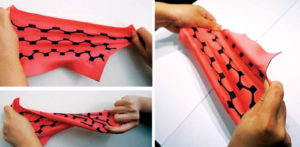
Combine fabrics and electronics, and these days, the possibilities seem endless. Now a research team at Binghamton University, State University of New York, has developed a smart fabric that doesn’t just contain electronics—the fabric is the source of the electronics. It’s called a bio-battery because it’s powered by bacteria.
Team leader Seokheun Choi, an assistant professor of electrical and computer engineering, has been researching this concept. Previously, Choi demonstrated that power could be produced using paper-based microbial fuel cells. The bio-battery has similar capabilities and can produce stable electricity when repeatedly stretched and twisted.
Choi and his team posit that microbial fuel cells are a preferred power source for wearable electronics, compared to traditional batteries and other enzymatic fuel cells. As a biocatalyst, microbial cells provide stable enzymatic reactions and a long life.
The person wearing the fabric could be a source of fuel: the human body contains more bacterial cells than human cells. An individual’s sweat can support bacterial viability, providing the long-term operation of the microbial fuel cells. The fabric’s ability to stretch enables the battery power to work complex and curvilinear shapes, like moving body parts or organs.
The research team is looking at ways these flexible and stretchable electronics could provide
enough power to be integrated with a wide range of surroundings to collect real-time information
for a number of purposes. For information, visit www.binghamton.edu.
 TEXTILES.ORG
TEXTILES.ORG


